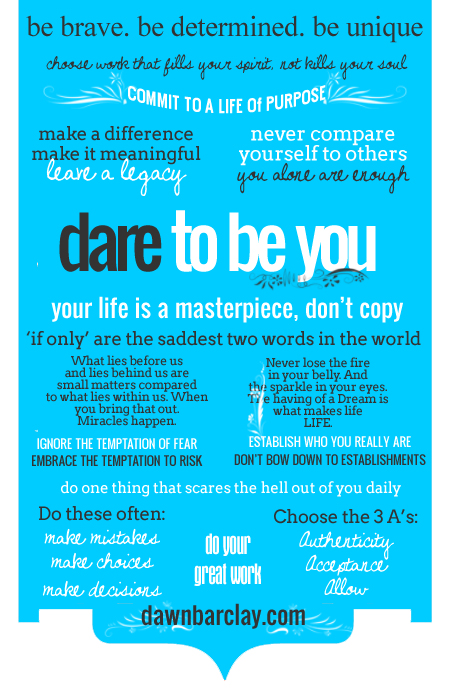 Quick Details: Dare to Be You is a 52 page free e-book and it can be found in the toolkit. It was written to inspire you to take action on those big beautiful ideas and dreams. To get access to it and all the other goodies, the sign up box-y-thingy is at the bottom of the page. But why not take two mins and read all about it.
Quick Details: Dare to Be You is a 52 page free e-book and it can be found in the toolkit. It was written to inspire you to take action on those big beautiful ideas and dreams. To get access to it and all the other goodies, the sign up box-y-thingy is at the bottom of the page. But why not take two mins and read all about it.
What’s in your future?
(Gulp!)
Looking backwards what decisions have you made for you, and how many were made by other people on your behalf?
When you’re alone in the night time silence: 3 am, up, unable to sleep, sitting with a drink because something is niggling away at you …
Do you meet with your real self?
Is she calling on you to remember who you really are?
Does she come to you with your real desires?
Does she remind you that there isn’t an infinite amount of time available to you?
Does she upset you?
Does she provide pictures of the unfilled promises you made her?
Maybe you feel you’ve let her and yourself down.
I get it. That dull ache. The secret pain.
Right-i-oh. Most people do know what they want from life, even you. In coaching it’s pretty obvious, most people come thinking they need to work it all out, where the truth (generally) is they just need to change their minds.
Joseph Campbell wrote, ‘Follow your bliss’.
Not doing it for you? Okay then …
Helen Keller once said, ‘Life is a daring adventure, or nothing’.
No? Still not hitting the spot? Try this one …
Somebody said, ‘You are the result of 4 billion years of evolution, fucking act like it’.
Eek!
The biggest no you can give yourself is the no to allowing yourself full permission to be who you really are.
Who’s that? I don’t know. I’m working on me.
I do think however it’s …
The you that is imperfect, great at making mistakes, trying and screwing up, falling and failing.
The you that is 1000x bigger than who you think you are.
The you that is brilliantly creative, loving and lovable, all present and whole.
The you that needs no explanation.
The you that embraces love over fear.
The you that is not afraid to take the journey inside.
The you that accepts the challenge of living, but won’t find it challenging.
To be the real you, I think, is the biggest challenge we can undertake. Sometimes we need a dare to take it.
It’s not easy. It’s a long road. One filled with our own barriers and roadblocks and those placed by others who don’t want us to step away from what’s ‘normal’.
To not be sucked into and drowned in the sea of mediocrity.
To not be stopped by fear when you are on the path of creating a meaningful life for you, your family and the world at large, whatever meaningful means to you.
The people I meet are ready, they generally have deep desires and have got to the point where enough is enough, and they are prepared to accept their own dares: to do whatever it takes to push past imaginary boundaries and limitations.
Ordinary peeps like you and me.
Deep down within them and perhaps you, there is a spark, they are ready to light up parts of their world, and the external world, and they refuse to sit idle, through their dare they are creating peaceful mini-revolutions.
Yet, they arrive here with a fear (or a number of them). Here‟s the thing, if you want to create your life on your terms, you‟ll need to have to have courage, and faith, spirit and stamina to dig deep, get to know who you really are and be 100% willing to do whatever it takes.
It doesn‟t matter who you are, where you are, if your past was good or bad. It doesn‟t matter your her-story or his-story, your life success and quality is created with what you did do, not by what you could’ve done.
I want you to dare yourself to start your crusade.
For you to stop pissing about and blaming, excusing, worrying, fearing, holding back and ignoring your true passions, desires and purpose.
I want you to dare you to live an awesome, remarkable, loving, truthful life.
Ready? Want to dare? Just sign up below, you’ll get all the toolkit goodies and updates. No, I won’t spam your inbox – urgh, who does that?
| [wps_custom_form id=”10″] |
 Sent via email this week was ‘When it comes to speaking up in meetings, I just panic, my mind goes blank, I feel stupid and it looks like I don’t know my job!’
Sent via email this week was ‘When it comes to speaking up in meetings, I just panic, my mind goes blank, I feel stupid and it looks like I don’t know my job!’ What’s your story? You will have one, we all do.
What’s your story? You will have one, we all do.